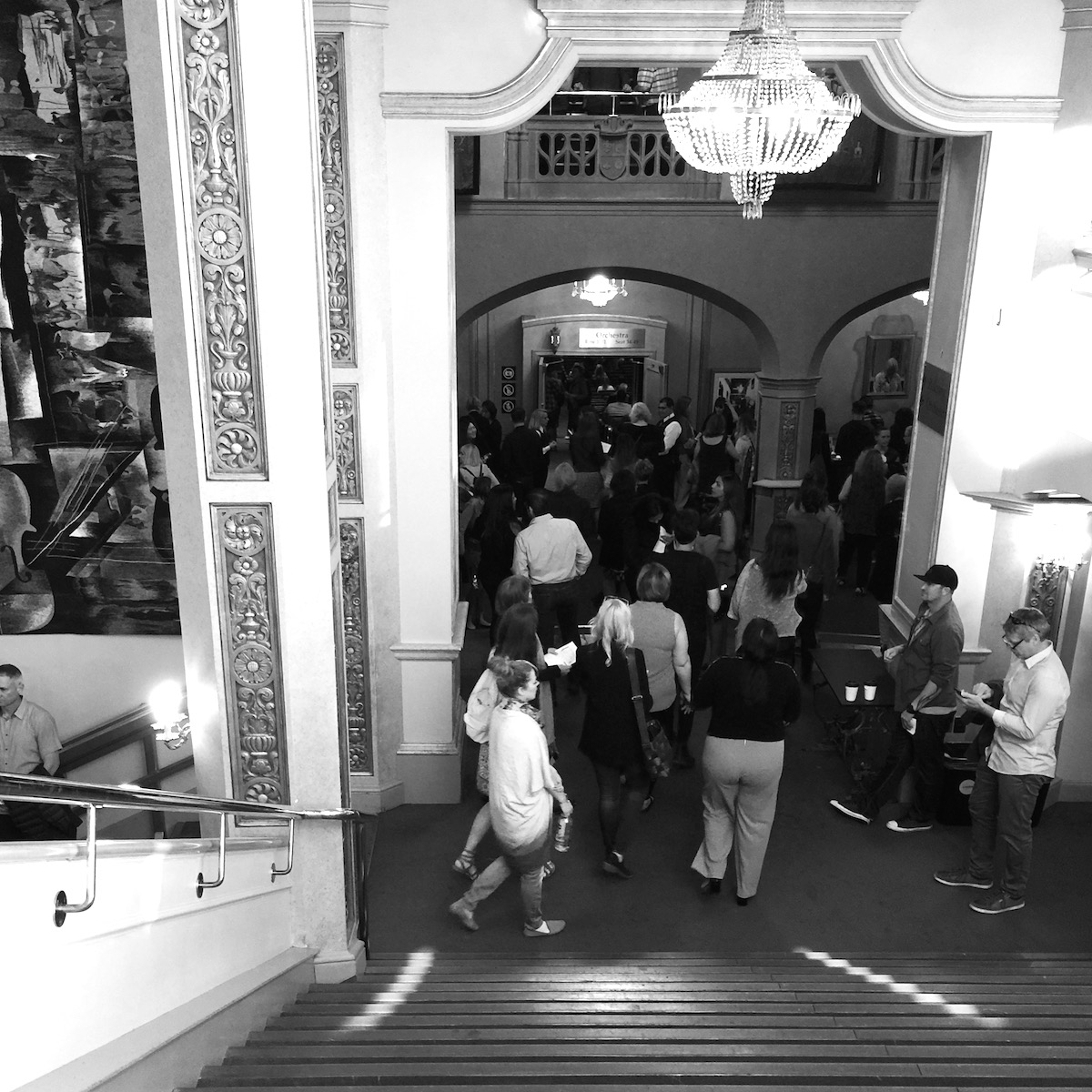Eckhart Tolle walks onto the stage. It is full house at the Orpheum in Vancouver. He sits down in a simple chair that has been set up on a rug along with a side table. A vase of flowers in full bloom gives life to an otherwise empty stage. Three large hanging screens project his image to the furthest corners of the concert hall.
He begins the evening about time, about how earlier he came across a restaurant receipt dated 2006 in his jacket pocket and that his book Power of One has been around for 20 years now. Many of you have probably heard of this book, if not read it. It has a 4.12 star rating, from over 130,000 ratings on Goodreads.
He connects with the crowd by illustrating how everyone feels time is like a speeding train that no one can get off, until there is a crash. “That’s when you get off.” Laughter fills the hall. Time gets everyone and everything. Not plastics, I thought. Not time on the human scale anyways. He regals the audience, many with pen in hand and paper on lap. He continues with stories to illustrate his core teachings about ego identification and presence.

Ego Identification
Ego identification is normal, he says, and the challenge is not to be over-identified with our body, our clothes, our cars, and other things we let become an extension of who we are. So this means we do not allow these things to be the basis on which we judge the degree of success, happiness, and other common markers.
We are also not to be identified with our mind, and our thoughts.
Identifying with our thoughts is dysfunctional thinking. Common for so many people, it is when every thought absorbs a person’s total consciousness. To the point that a person is completely identified with these thoughts, with this voice that never, ever stops talking. You have probably experienced this, too.
We are not our thoughts as the ripples and waves of the ocean are not the ocean.
Many people live with a tormentor in their head that continuously attacks and punishes them and drains them of vital energy. It is the cause of untold misery and unhappiness, as well as of disease.
Eckhart Tolle
Everything Eckhart Tolle talks about, all the words, he reminds the audience are but a signpost. Like pointing to the moon, the finger is not the moon, the words are not the concept.
To understand a concept requires us to be open, and listen to more than the words. So he invites us to sense it, without the interference of thought.
Throughout the evening, we pause to sense and be in this spaciousness.
It is in the moment, without thoughts of the past or future, that we can transcend. Without thought, we do not get trapped by ideas such as the self as a problem to be solved. Or thoughts such as “I haven’t arrived yet”.
And here’s the thing…
Perhaps to the audience’s disappointment, Eckhart Tolle pointedly says that even with spiritual awakening, the challenges of life do not stop. What does happen is that we will no longer transform whatever we see as challenges into unhappiness and into the sentiment of “unhappy me”.
The Surface "I"
He compares people to a dog who, on yet another rainy day in Vancouver, does not get depressed and think “this shouldn’t be happening.” That is how some people think, living from the surface self, the surface “I”- the “narrative-based, conditioned entity”.
It is with presence, by living from the deeper “I” that we internally transcend the “burden of life circumstances” that we all have.
What is Presence?
The main thrust of the work of cultural philosopher and poet Jean Gebser (1905 – 1973) is the unfoldment of consciousness. To him, presence or being present is consciousness.
Consciousness is neither knowledge nor conscience but must be understood … in the broadest sense as wakeful presence.
Jean Gebser1
In his seminal work Ever-Present Origin, Jean Gebser writes about the evolutionary surges of consciousness.
The five eras of development he theorizes are Archaic, Magical, Mythical, Mental, and Integral. The origin, the source of all, is spiritual. Each consciousness stage reveals this spirituality more and more transparently, a non-linear unfoldment.
At this time we are in the deficient mode of the Mental consciousness structure, and at the precipice of a new structure. In this current phase, Man seeks to master the world. We have done so by separating ourselves from the world. Over time, our mental and materialistic processes have become the dominant mode of thinking, analyzing, and abstraction.
These same processes of being which served us well before are now the problem. The deficient mode of a structure is when what was once an asset and efficient becomes an extreme and hence an obstacle to progress. In the deficient mode we experience alienation from nature and spirit and loneliness.
The Next Stage
A new method and a new consciousness structure is now called for. Carl Jung describes this as enantiodromia, where an extreme condition inevitably rebalances, with the unconscious counteracting the conscious. While this is more of a reversal, the pendulum swinging back, the next stage for Jean Gebser is integration.
For him, the fifth and the next structure is the process and the effect of merging of partials into the whole, rather than a synthesis or piecing together, the abstract being “anchored in actual life” as described by Gebser.
Linking back to Eckhart Tolle's teachings
Consciousness structure changes through time. The era where rational and linear thought and materialist science reign is drawing to a close.
The Rational structure, the deficient mode of the Mental structure, elevates materialism above all else. We see this in reductionism and mechanization. We see it in the focus on action and the tangible. These qualities and advances are not destructive per se. However, we are unbalanced when they are promoted to the detriment of the inner experience, contemplation, the unseen, the symbolic, gnosis, and the felt experience.
As we move in consciousness into the next era, these other forms of knowing are more supported and are therefore in some ways, more accessible by people in general.
The unconscious contents are not always polite, they can burst into our conscious life in sometimes terrifying ways. They are willing to work with us if we are open to them, but they will make themselves felt, whether we want them to or not.
Gary Lachman, The Secret Teachers of the Western World2
Even though a new process and structure is in order, we are not discarding what has come before. We are not demonizing technology or what are commonly termed “left-brain” activities. It does require, for example, the supercession of the ego and the realization of timelessness, which are also part of Eckhart Tolle’s teachings.
That evening at the Orpheum, Eckhart Tolle jokes how thankfully he will never need to look for a job. As he puts it, he can lists “skills:none” on his resumé. The audience roars in laughter. Probably more than a handful reminiscing about their own job search. Or perhaps delving into the type of job security our speaker has.
Eckhart Tolle goes on to say that his one skill and his greatest achievement is “I don’t think all the time anymore.”
Presence in the moment, he says, is not being in the thinking mind.
This is from the man who spent two years on a bench, feeling the most intense joy.
This article is based on an evening with Eckhart Tolle at the Orpheum in Vancouver on 12 May 2018.
1 The Ever-Present Origin by Jean Gebser. 1949 (translated into English 1985) p42 as quoted in Brian Johnson’s Master’s Thesis from the California Institute of Integral Studies c. 1999 called The Evolution of Integral Consciousness and The Paradigm of Complexity.
[scribd id=87923816 key=key-1oiz0mcnc4blk6zyiofg mode=scroll]
2 The Secret Teachers of the Western World by Garry Lachman. Penguin: New York, 2015. p24.
Further Readings
The Primordial Leap and the Present : The Ever-Present Origin – An Overview of the work of Jean Gebser
[scribd id=14424985 key=key-qepo7ynsafguixf3sbt mode=scroll]
Creating Consciousness to Grow in Presence Power by Eckhart Tolle link

